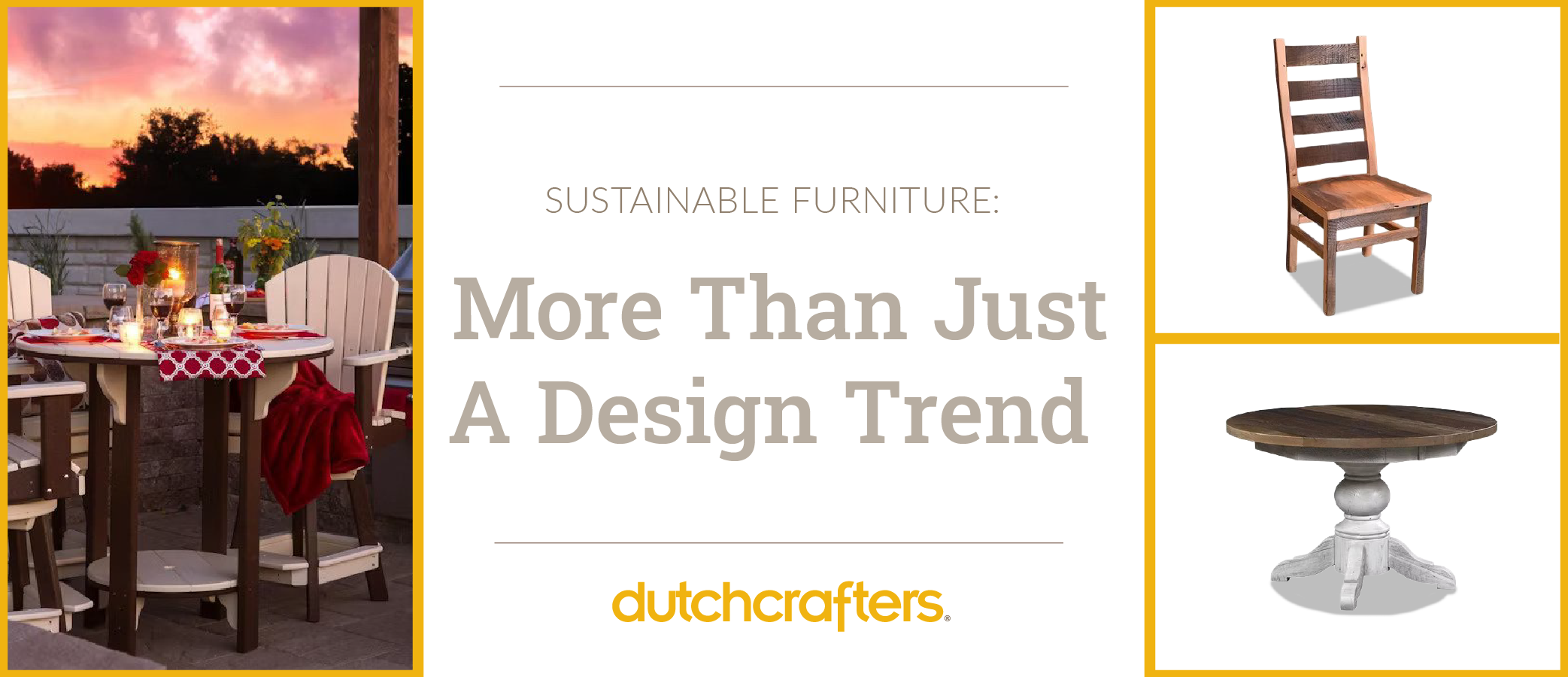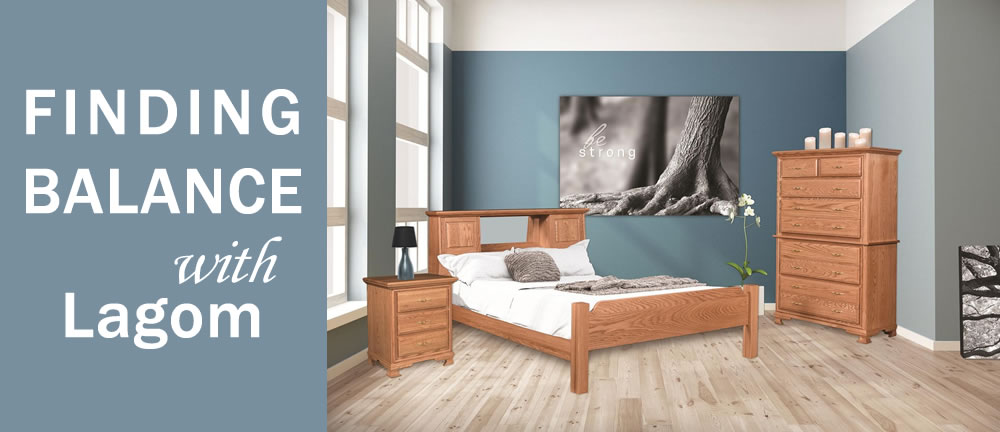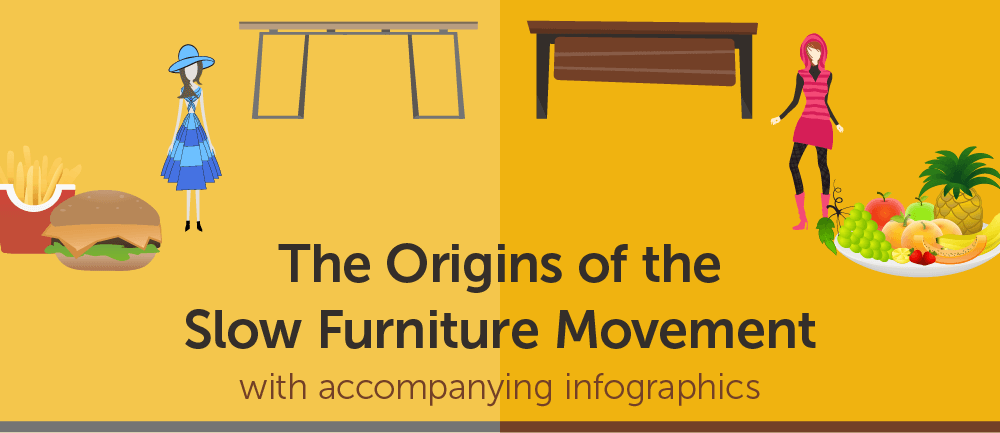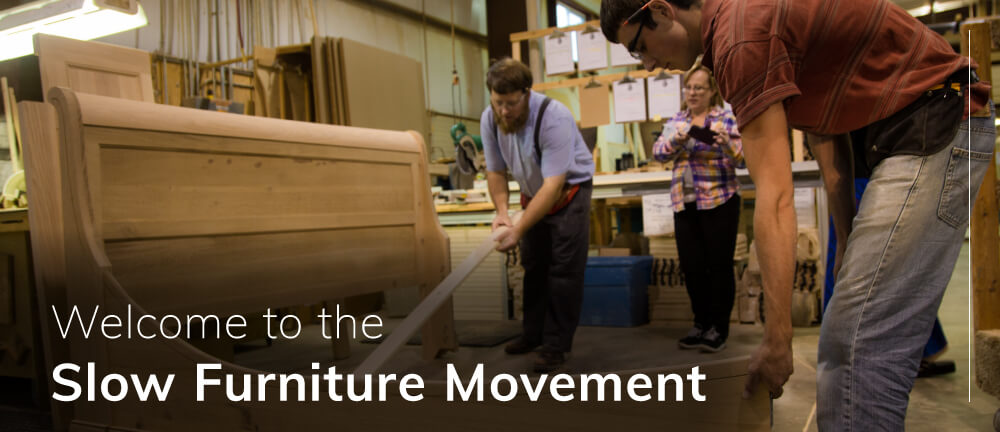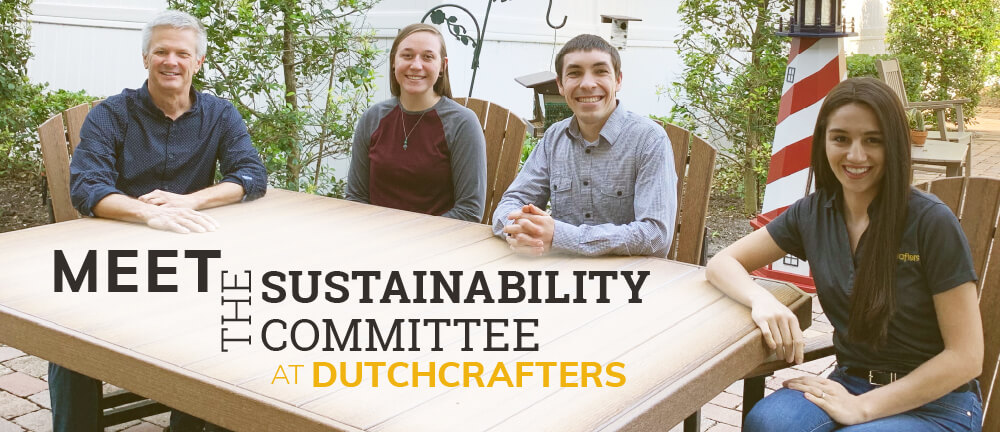
Meet the Sustainability Committee at DutchCrafters
One of the most disappointing things Marina de Sa Nogueira, chair of the Sustainability Committee at DutchCrafters has heard is….
One person will not make a difference. One plastic bag or one straw is not going to matter.
According to Marina and the members of the DutchCrafters Sustainability Committee, one person can make a difference and a big one I learned as I sat down to chat with them in the DutchCrafters Showroom.
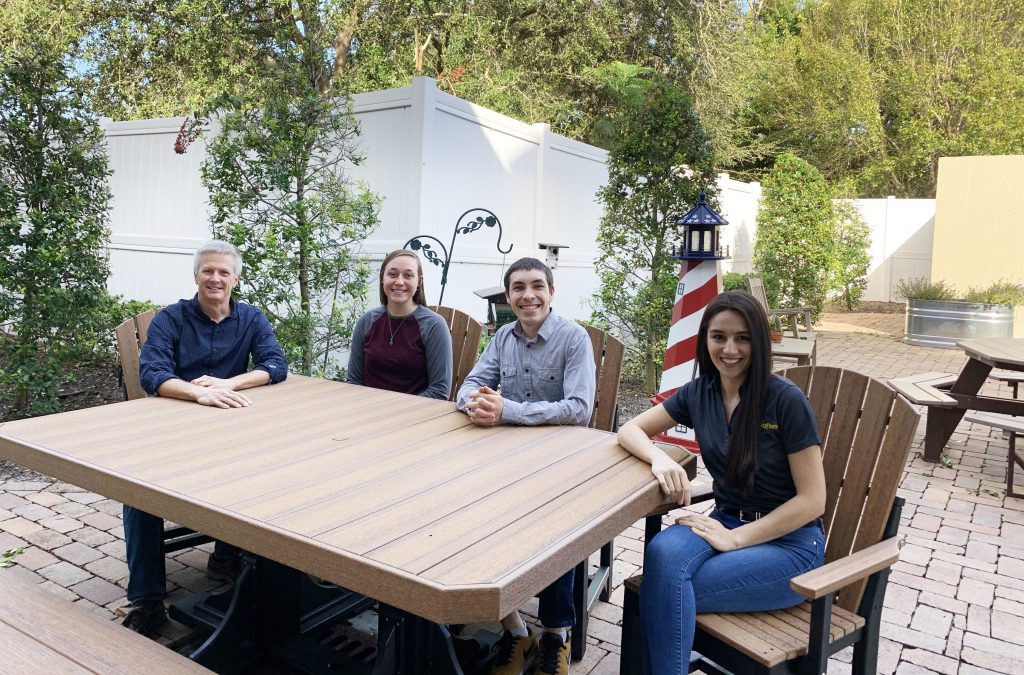
The Sustainability Committee
Sustainability is a company core value at JMX Brands, the company that owns DutchCrafters Amish Furniture, along with creativity, authenticity, giving and excellence.
What is sustainability exactly?
Not to be confused with eco friendly (not harmful to the environment), sustainability puts in place a system that can run efficiently and maintain itself. This system does not compromise other systems, and it does not cause damage or depletion of resources.
Why did you start the Sustainability Committee?
Marina: With sustainability being one of our core values, our CEO Jim Miller felt it was important to have a committee to spread it across the company.
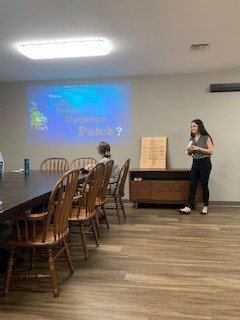
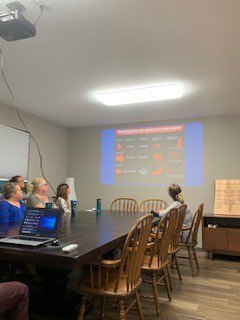
How have you incorporated sustainability in your work?
Anna: I only use recycled packaging material. I try to be conservative with the amount of packing material while keeping the products to be shipped safe. I’m always keeping in mind the most sustainable approach to shipping Amazon products.
Jake: I’ve always seen sustainability as important to our company, and I take advantage of the Green Sustainable Bonus they offer by biking to work. It’s exciting to see the intentionality of this committee, and the effect that it might have over all of our operations. In my specific job (video producer and graphic designer), I try little things like not using too much paper and turning off my computer overnight.
Kari Jo: I reduce waste by printing very little and by not using single use plastics like bottles or utensils. I am also working to make our warehouse in Indiana sustainable by using blankets for packaging and storing furniture.
How have you involved the company in sustainability?
Marina: We try to be good examples for our peers and try to keep them engaged.
Steve: We try to create more of an awareness of the impact people can have both positive and negative.
Jake: We’ve asked the company to save paper that’s printed on one side and use the other side and we keep boxes near printers to collect it. We recycle all printer and toner cartridges.
Anna: We encourage staff to bring in plastic grocery bags and batteries, and we will recycle them. We ask for donations of any packaging material that we can either use ourselves or recycle.
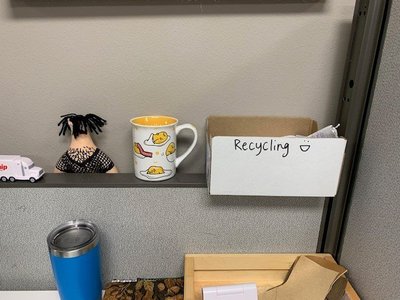
Marina: At JMX we brew a lot of coffee and we don’t use the single pods. We use a conventional drip coffee that uses the paper coffee filters. It’s an easy thing to do at work or at home.
The Sustainability Committee conducted two company-wide projects this past year.
The Trash Collection/Reduction Project
The goal: To reduce the amount of trash generated throughout the office, to increase recycling, and to raise awareness of daily habits regarding waste and recycling.
Marina: We measured the amount of trash collected here at the office on a weekly basis for a month. There was improvement, with a reduction in the trash that we collected and an increase in recycling. The project helped keep people aware of what they were doing.
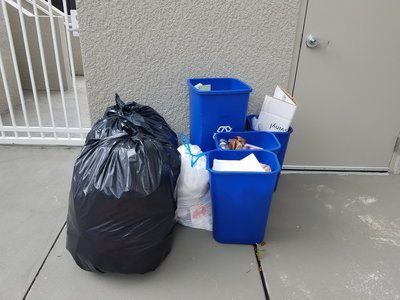
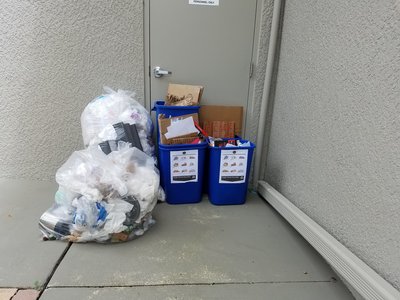
The Eco Challenge
The goal: To raise awareness of ways to practice sustainability on a daily basis and to better the environment with these habits.
Points were awarded for each task performed and a weekly tally was kept. The employee who earned the most points at the end of a 4 week period received an award.
Jake: The Eco Challenge was inspired by a water saving challenge my church did last year and that we did here at the company as well. The goal was to get people thinking about new ways they can save electricity and money and limit their carbon footprint at home and work.
Some tasks suggested by the eco challenge included:
- Washing laundry in cold water: Worth 1 pt.
- Using reusable grocery bags: Worth 1 pt.
- Unsubscribe from unwanted mailing services: Worth 3 pts.
- Use only reusable silverware, plates and cups: Worth 5 pts per week.
- Watch the movie WALL-E: Worth 10 pts.
- Start a home garden: Worth 20 pts.
View the complete Eco Challenge list, and take it yourself to test how sustainable your lifestyle is. Follow this link to see how you do!
The One Month Climate Change Challenge.
What pleased or disappointed you about the results of the company sustainability projects?
Marina: With the trash collection, I liked the improvements, but it seemed like it didn’t stick, and trash has increased again. Some bottles and bags get thrown out instead of recycled.
Anna: We saw less of a reduction in trash but more of an increase in recycling.
Jake: The phrase Reduce, Reuse, Recycle is in that order for a reason. We didn’t see a big reduction in trash.
Anna: We saw some improvements in staff habits. One employee got a reusable water cup and a Brita pitcher so that makes for a reduction in plastic water bottles.
Marina: I was surprised about the number of people that participated in the challenge! We had a good number of people participate consistently.
What sustainable practices do each of you practice outside of work?
Steve: At home we have replaced all our light bulbs and lowered our water heater. We decrease the heat or increase the AC so we’re more conscious of the air conditioning. We use reusable bags for the most part when we go shopping. We compost.
Beth: How simple is composting?
Steve: I think it’s easy. The challenge is having a bin to collect it in and storing it until you take it out. We used to have a counter bin, now we have one that goes underneath the sink.
Anna: I do lots of recycling, and I use reusable shopping bags.
Steve: We’ve got a Keurig and use the refillable pods instead of the individual cups.
Marina: I use reusable produce bags. I avoid eating meat to reduce impact; I follow a vegetarian diet. I have toiletries I use, like a bamboo toothbrush, instead of plastic.
Anna: I have one of those too.
Marina: I have plastic-free deodorant and a plastic-free razor. I recycle. We just use a small heater to heat the room instead of using heating for the whole house. When I’m shopping, I try to look for a brand or item that has less packaging. I would rather pay more than get more plastic. I also don’t shop as often as I used to for clothing.
Jake: I bike to work instead of drive, and I do the little things like reusable produce bags. I have wool dryer balls to use instead of dryer sheets. Some of the big things are I live close to work and I live in a small apartment that shares walls with other people; that’s more efficient to heat and cool. I don’t eat a lot of meat at home, and I buy very few new items or material goods in general.
Kari-Jo: I recycle and rarely use single-use plastics. I have a water cooler at home to eliminate plastic bottles. I turn off the lights when I leave a room, and I keep the air conditioning temperature in the house at 78 degrees.

What questions have people posed to you about sustainability?
Jake: I get questions about whether certain products are recyclable and if they should go in the trash or recycling. In general, I encourage people to look up their city or county’s recycling rules. If you’ve got something that’s all one material, it’s probably recyclable. If it’s metal combined with other material, it’s probably not recyclable, and if it has food or liquid in or on it, it’s not recyclable.
What are some easy sustainability practices people can incorporate in their daily life?
Anna: Get a reusable water cup and a small water filter, like a Brita pitcher with a filter. These can easily be used instead of going through hundreds of plastic water bottles. Remember, with a Brita filter, you won’t run out of water, and there won’t be a need to run to the store for more.
Steve: Plus, you will save room since you won’t have to make space to store cases of water bottles.
Anna: Reusable bags for groceries.
Steve: Adjust the water heater.
Marina: Eating less meat. You don’t have to be a vegetarian. Just make it easy and have a meatless Monday—even just one meal of the week or day of the week makes a huge difference.
Steve: Yes, if people could do even just one meatless meal a week, it would make such a difference.
Anna: It’s cheaper, tastier, more satisfying…
Kari-Jo: Use a refillable bottle for water. Recycle. Walk or ride a bicycle instead of drive.
What do you want to be sure people know about sustainability?
Marina: It’s so disappointing to hear someone say “one person will not make a difference, or one plastic bag or straw is not going to matter.” It can make a big difference.
Anna: It’s important people know plastic bags should not be thrown in their recycling bin, they can ruin the machines used to recycle products. Including them in there can cause the entire contents of your recycling bin to get dumped.
Kari-Jo: There are far-reaching effects of one person that’s working to be sustainable.
Marina: Remember, every little bit does count. Don’t think that one bag won’t make a difference. I love this quote:
We don’t need a handful of people doing zero waste perfectly. We need millions of people doing it imperfectly. Anne Marie Bonneau
What’s next for the Sustainability Committee?
This year, our company became a member of the Green Business Partnership of Sarasota County and the Sustainable Furnishings Council.
The Green Business Partnership required a sustainability audit that included an on-site inspection as well as an electricity audit. Once approved, we adopted the Green Business Pledge which “believes that a successful business is dependent upon a healthy environment. We pledge to demonstrate our environmental stewardship by reducing waste and conserving natural resources, and by operating an environmentally responsible business.”
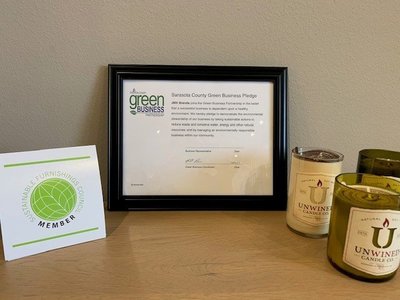
The Sustainable Furnishings Council recommends companies that offer furnishings that are made and distributed in ways that protect the planet.
Marina: Steve will offer new leadership for the committee in 2020.
Steve: We will be focusing on community involvement and what influence we can have in our own industry. We started with a survey to our vendors to see who is using sustainable practices. We’re going to see what else we can learn from our vendors and try to spread out from there.
Sustainability through the Slow Furniture Movement
DutchCrafters Amish Furniture has launched the Slow Furniture Movement that “embraces the deliberate creation and use of durable furniture” and “values quality over quickness.”
The goal of the slow furniture movement is to spread the idea that furniture that’s made slowly and with quality materials will last longer and perform better, saving the customer money in the long run and benefitting the environment by not contributing to waste.
The slow and careful crafting of wood furniture means a longer wait, a higher price and a slower delivery, but we are committed to standing by the process with the ultimate benefit being a better quality product that’s better for the customer and better for our world.
DutchCrafters prides itself on sustainable practices, and we’ve always embraced the practices of our woodworkers from Amish country and their concern for producing little waste and for selecting wood for the furniture we sell from sustainably managed forests.
JMX also owns a sister site to DutchCrafters called Eco Friendly Digs that sells furniture and home décor that’s sustainably sourced and environmentally friendly.
Two popular furniture categories at DutchCrafters are poly outdoor furniture and reclaimed wood furniture, both environmentally friendly options.
Poly Outdoor furniture utilizes recycled plastic that comes from milk jugs and laundry detergent bottles to make highly durable poly lumber outdoor furniture.
Our reclaimed wood is collected from old barns that are taken down. The wood is decades old, and instead of throwing it out, craftsmen salvage it to make stunning furniture.
Find out more about the Slow Furniture Movement and the Sustainability Committee at JMX on our blog or in our video library.


